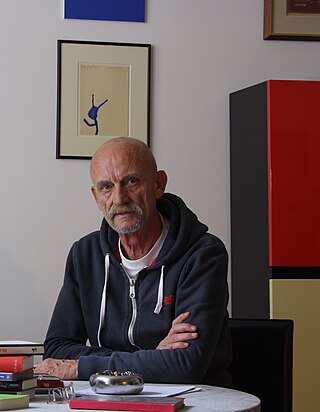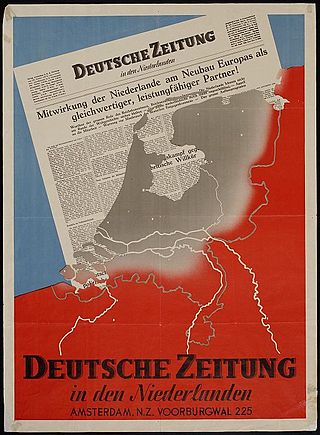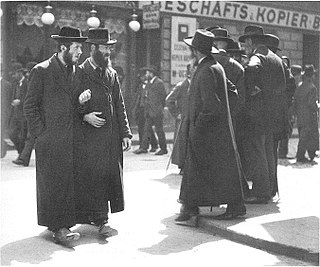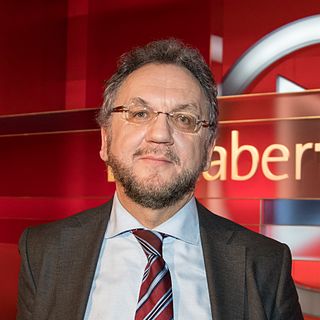Related Research Articles

The Neue Zürcher Zeitung is a Swiss, German-language daily newspaper, published by NZZ Mediengruppe in Zürich. The paper was founded in 1780. It has a reputation as a high-quality newspaper, as the Swiss-German newspaper of record, and for detailed reports on international affairs.

The German National Movement in Liechtenstein was a Nazi party in Liechtenstein that existed between 1938 and 1945.

Martin Dannecker is a German sexologist and author.

Georg Robert Döpel was a German experimental nuclear physicist. He was a participant in a group known as the "first Uranverein", which was spawned by a meeting conducted by the Reichserziehungsministerium, in April 1939, to discuss the potential of a sustained nuclear reaction. He worked under Werner Heisenberg at the University of Leipzig, and he conducted experiments on spherical layers of uranium oxide surrounded by heavy water. He was a contributor to the German nuclear weapon project (Uranprojekt). In 1945, he was sent to Russia to work on the Soviet atomic bomb project. He returned to Germany in 1957, and he became professor of applied physics and director of the Institut für Angewandte Physik at the Hochschule für Elektrotechnik, now Technische Universität, in Ilmenau (Thuringia).

The Deutsche Zeitung in den Niederlanden was a German-language nationwide newspaper based in Amsterdam, which was published during almost the entire occupation of the Netherlands in World War II from June 5, 1940 to May 5, 1945, the day of the German capitulation in the "Fortress Holland". Its objective was to influence the public opinion in the Netherlands, especially the one of the Germans in this country.

Alfred Polgar was an Austrian-born columnist, theater critic, writer and occasionally translator.

Heribert Prantl is a German author, journalist and jurist. At the Süddeutsche Zeitung he was head of the department of domestic policy from 1995 to 2017, head of the department "opinion" from 2018 to 2019, member of the chief editors from 2011 to 2019 and is now columnist and author. Since 2002 he has been a lecturer at the faculty of law at Bielefeld University, where he was appointed honorary professor in 2010.

Ilse Frieda Gertrud Stöbe was a German left-wing journalist and anti-Nazi resistance fighter. She was born and died in Berlin.

Ernst Peter Fischer is a German Historian of Science and Publicist.

Oliver Mark is a German photographer and artist known primarily for his portraits of international celebrities.
Manfred Rühl is a German communication scientist with a social science background.
Wilfried Loth is a German historian and political scientist.
Hans Hermann Adler was a German professor of journalism at the University of Heidelberg.

Elke Erb was a German author-poet based in Berlin. She also worked as a literary editor and translator.

John Friedrich Karl Rittmeister, often also abbreviated John F. Rittmeister, was a German neurologist, psychoanalyst and resistance fighter against Nazism. Rittmeister was a humanist and socialist who based his opposition to the Nazi state on moral grounds. He was known as a communist member of the anti-fascist resistance group that was later called the Red Orchestra by the Abwehr.

Fritz Jöde was a German music educator and one of the leading figures in the Jugendmusikbewegung.
Hans-Christof Kraus is a German historian.

Erwin Gehrts was a German conservative socialist, resistance fighter against the Nazi regime, journalist and colonel in the Luftwaffe. Trained as a teacher, Gehrts was conscripted as a flying officer during World War I. During the interwar period, he became a journalist. However, with the emergence of the Nazi states, his newspaper, the Tägliche Rundschau, was banned. Finding work with the Luftwaffe, he became disillusioned with the Nazis. He became associated with a Berlin-based anti-fascist resistance group that was later called the Red Orchestra by the Abwehr and an informer to Harro Shulze-Boysen, passing secrets from the air ministry.

Martin Weise was a German journalist, member of the Communist Party of Germany (KPD) and a resistance fighter against the Nazis during World War II. From 1929 to 1934, Weiss published the socialist Die Rote Fahne newspaper. He was arrested and sent to a concentration camp until 1939. When he was released, he decided to resist and made contact with Wilhelm Guddorf and the Hamburg based group around Bernhard Bästlein and Robert Abshagen He became associated with an anti-fascist resistance group that was run by Harro Schulze-Boysen and Arvid Harnack, that was later called the Red Orchestra by the Abwehr.
Sepp Ritter was a veterinarian and politician from Liechtenstein. He was the leader of the German National Movement in Liechtenstein from 1943 to 1945, a Nazi Party that aimed to unify with Nazi Germany.
References
- 1 2 3 4 Revue suisse d'histoire. Vol. 53. Allgemeine Geschichtforschende Gesellschaft der Schweiz. 2003. p. 71.
- 1 2 Urs Altermatt; Catherine Bosshart-Pfluger; Joseph Jung; Franziska Metzger (2002). Nation und Nationalismus in Europa: Kulturelle Konstruktion Von Identitäten ; Festschrift Für Urs Altermatt. Huber. pp. 238–239. ISBN 978-3-7193-1299-2.
- 1 2 Gustaf Adolf von Metnitz (1941). Hundert Millionen Deutsche schaffen Raum. NS.-gauverlag Steiermark. p. 15.
- 1 2 3 Gerolf Hauser (2002). 100 bewegte Jahre in Liechtenstein von 1900-1999 (in German). Liechtensteiner Volksblatt. p. 46.
- 1 2 3 4 Marie-Jeanne Heger-Étienvre (2005). La Suisse de 1848: réalités et représentations. Presses universitaires de Strasbourg. pp. 51, 55. ISBN 978-2-86820-281-9.
- 1 2 Institut für Publizistik der FU Berlin (1960). Handbuch der Auslandspresse: Herausgegeben vom Institut für Publizistik der Freien Universität Berlin, unter Leitung von Professor Dr E. Dovifat. Anthenäum-Verlag. p. 154.
- ↑ NZZ-Folio (7-12 ed.). Verlag NZZ-Folio. 1996. p. 22.
- ↑ Theodor Veiter (1966). Volk, Volksgruppe, Nation: Theoretische Grundlegung. Braumüller. p. 39.